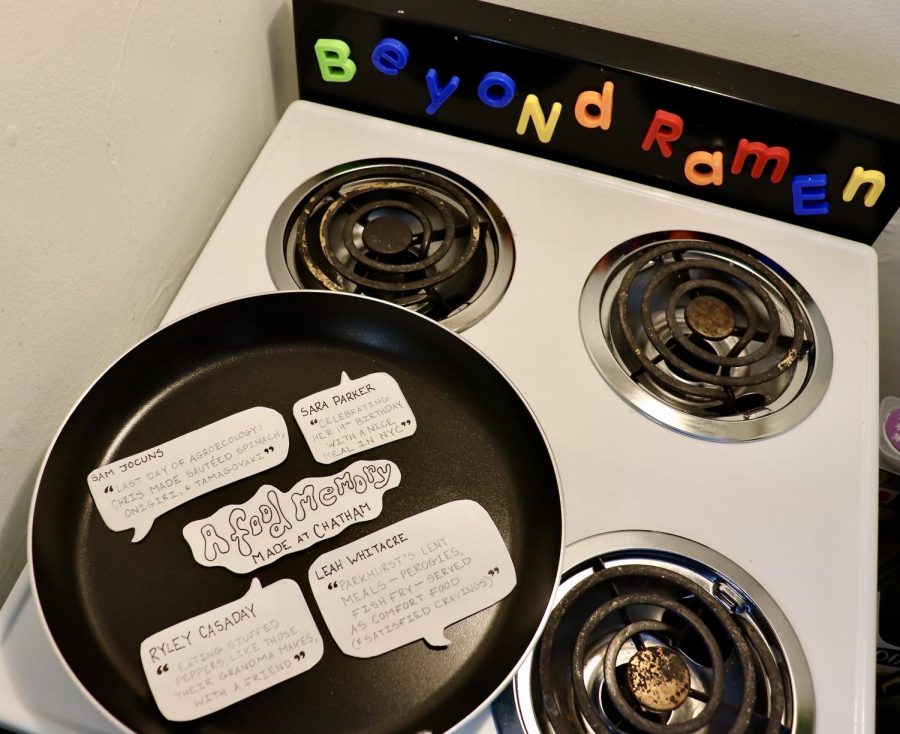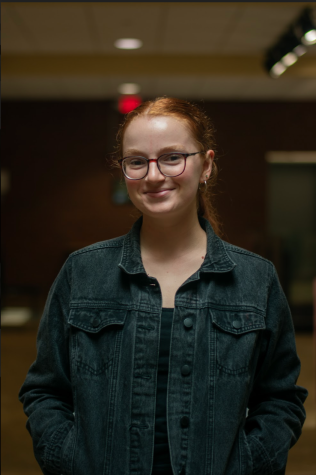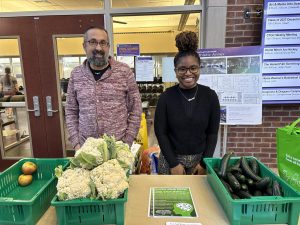Beyond Ramen: Students recall a food memory made at Chatham
January 25, 2022
If I were to imagine a pie chart of how I spent my time outside of class this past fall, it would look something like this: 5% reading a book that I started way back in June, 5% talking to my dog over FaceTime, 10% walking or taking the bus to run errands, 15% excessively cleaning our apartment (a.k.a. positive procrastination), 20% with friends and 45% thinking about or eating food.
In reality, these estimations are probably far from the truth. Ironically, I’m too embarrassed to admit exactly how much time I spent watching “Shameless,” but you get the idea. The majority of my day was dedicated to planning when I could squeeze in a meal between classes, cooking that meal and, more than once, burning that meal.
When I wasn’t making a mess in our tiny kitchen, I was talking to peers about their eating experiences on campus.
I took notes in between laughing as I chatted with Sam Jocuns ‘23, making banana bread in her apartment over Zoom. We agree that banana bread is the intersection of an easy food we need as college kids and the waste-minimizing baked good our brown, frozen bananas need, too.
Jocuns transferred to Chatham in fall 2020 from a school in Florida, where she said she enjoyed more diverse meal options – but also recalled a week when the dining halls were under construction and students had to eat all three meals from Wendy’s.
Jocuns lives alone, about a 15-minute walk away from Chatham’s Shadyside campus. Following a piece of advice she received before matriculating, she’s not on a Chatham meal plan. Instead, she buys groceries from Giant Eagle once every two weeks or so.
Jocuns usually does not eat breakfast, typically prepares lunch and dinner herself, and gets takeout from local restaurants on occasion. There was – and still is – definitely a learning curve for Jocuns transitioning from her family’s minimal-waste, Greek kitchen, she said. Accounting for the labor it takes to make larger meals ahead of time – and making sure perishables get eaten or preserved – is much different with only one mouth to feed.
Reducing waste is particularly important to her now that she pays for what she eats and sometimes has to trek with a backpack full of her hard-earned groceries to her apartment in the snow.
For Leah Whitacre ‘23, meals are an important communal moment. As an Orchard Hall resident at Chatham’s Eden Hall campus, they share their food with a close-knit group of neighbors nearly every day. The only option for Eden Hall dwellers is a campus-specific meal plan that allows unlimited meals. The catch, Whitacre said, is that Eden Hall dining hours are more restricted. Offerings are improving, though, and frequently include food grown on the campus, but that often still leaves students — especially those with dietary restrictions — in need of more options.
Whitacre noted an enforced policy that prevents students from taking second helpings in a to-go box — something they have done in the past to cope with dinner ending at 7 p.m.
Whitacre has noticed internal issues within dining services, such as training new hires and making sure there are enough staff members to cover already limited shifts, that they hope are resolved soon. At the moment, there is only one full kitchen at Orchard Hall. It was technically not designed to be communal, but residents have been allowed access through an unoccupied room.
Whitacre does not usually feel comfortable in a communal kitchen, nor does it make financial sense to buy ingredients when they are required to be on a meal plan, even though they do enjoy preparing food. As it stands now, they are opting to deal with the inconsistencies of campus dining, keeping quick snacks in their dorm room and making emergency runs to the nearby GetGo for any supplements.
Sara Parker ‘25 and Ryley Casaday ‘25 joined me for lunch in the Eden Barazzone Center (EBC) Kitchen. Parker lives on Shadyside’s upper campus and utilizes a meal plan. Casaday lives independently but has purchased a meal plan as it is convenient for them to get lunch in between classes at Eden Hall. Both agreed that time and scheduling play a big part in how they eat as students. For Casaday, this means making time in their week to pick up groceries, cook and plan for eating as one.
Parker’s experience eating on-campus has fallen short of what she expected. She shares recurring frustrations about the operating hours of Anderson Dining Hall and a lack of variety in healthy, filling offerings. Since coming to Chatham, Parker feels her diet is less balanced and simply less enjoyable.
On top of this, she voices her concern about food quality. Parker and fellow students have been given visibly undercooked chicken from Parkhurst’s pick-up services, namely Cinco Cantina. When asked why she had not reported the incident, she said she anticipated inaction on Parkhurst’s part. Parker wanted to make it clear that while her interactions in Anderson with Parkhurst staff have been overwhelmingly positive, she feels unsure about sharing her experiences for fear of how upper-management will handle it.
The bottom line: students on both campuses who depend on dining services often struggle to get a full meal. There seems to be a disconnect between Chatham, Parkhurst and the resulting impact on students’ sense of food fulfillment.
This is particularly a source of concern for students whose time pie charts resemble mine. Eating food that is accessible, nutritious and enjoyable is something all college students should be able to do.









frustrated & hungry '25 • Jan 25, 2022 at 7:04 pm
Wish we had choices outside of our dining halls. A lot of my friends at other colleges can spend flex dollars or even use their meal swipes at other restaurants, either for full meals or some sort of cash equivalent. In my experience Anderson has generally been pretty bad.
It’s like the people who run it treat our dining hall as if they don’t need to try that hard because we don’t have a choice. And the food too often tastes like it.
Though for whatever reason, I have always preferred eating at Eden Hall versus Anderson. Somehow the food is just better there. So maybe the people running it, or the cooks, etc., have something to do with it as well. I sure don’t know, but am glad this story is out there & really hope that Chatham administration does something about it. Really would like to actually use my meal plan & eat on campus more often!